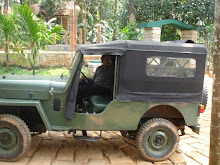I wanted to read some fiction and found a book called 'Immortals of Meluha' lying in the garage. My Bro had bought the set of 2 books, but had dumped in the garage for some reason. The only reason why I picked up the book to read was, I was feeling bored and the cover page had a 'Jataadhaari' with his back with a 'Trishul', which made it look somewhat different.
The story starts near Manas Sarovar, near Mount Kailash. Going on a trip to Manas Sarovar has been my dream for a long time, and I hope to do it sometime during this life. As a matter of fact, this is the reason I continued reading beyond the first page.
The plot starts with a tribal lord of 'Gunas', called Shiva, who thinks he is a normal human being taking the place of God. Shiva gets an offer to immigrate to 'Meluha' ruled by a Survavanshi king called 'Daksha'.
Suryavanshis are people who deserve a PMP and ITIL certifications. Their architecture is driven by 'Enterprise Architecture' techniques similar to the TOGAFs, Zachman's of the current day world. Orderliness prevails in their daily life and they wouldn't go even an inch away from the agreed upon rules.
Suryavanshis have a secret magic potion called 'Somras' (like the Obelix and Asterix comics), which is prepared using the water of river Saraswati. This Somras ensured that the Suryavanshis had a healthy and long life. There were some unfortunate souls called Vikarmas who were believed to be cursed due to their sins in past births.
Shiva and his people migrate to Meluha at the invitation of 'Nandi'. They travel across the Himalayas and enter a city called 'Srinagar' where they are treated by an able Doctor called 'Ayurvati'. Without the knowledge of the tribals, they were fed with Somras. Shiva becomes 'Neelkanth' here, without his knowledge. The Meluhans would be waiting for Neelkanth to lead them.
He would accompany 'Nandi' and Bhadra to Devagiri which is the capital of Meluha to meet Daksha, the King. On the way to Meluha he sees 'Sati' who was Daksha's daughter and also a Vikarma. Sati would be a very beautiful lady and a valiant swords-woman. Shiva makes a visit to Mount Mandar where the Somras was produced and meets Brahaspati. They get so close to each other that Shiva considers Brahaspati his elder brother. When the entire Meluhan nation would have been taken over by the 'Neelkanth' hysteria, Brahaspati would be one of the few who talks sense to Shiva, making them even closer. The other character that is equally impressive is Parvateshwar, the chieftain of Meluhan Army. He doesn't approve of Shiva's ways initially, till he sees Shiva in action against the evil Chandravanshis in a war. He becomes an ardent supporter of Shiva beyond that.
An attack on Mount Mandar ensures that the production unit of Somras goes up in ashes and the Suryavanshis believe that Chandravanshis hatched a conspiracy to raze the production unit. A war ensues between the two, a meticulous, and a small Meluhan army versus a large Chandravanshi army. Shiva leads from the front to ensure a Suryavanshi victory.
After winning the war against a large Chandravanshi army, Shiva and the Suryavanshis go to Ayodhya, which would be the capital of Chandravanshis. The city of Lord Ram, whom both the Suryavanshis and Chandravanshis believe as their benefactor and the guiding light. Chandravanshis also would have an unstinted devotion to Neelkanth and that helps Shiva in a big way. Shiva creates peace between Suryavanshis and Chandravanshis and realizes that they have a common enemy, the Nagas. The story ends with a realization for Shiva that Chandravanshis are not evil, but are different.
Each of the characters portray a very strong reason for their existence in the plot. Amish Tripathi has given a gem of a book. I could not keep the book down till I completed the book in one shot. The book has a lot of twists and turns and definitely makes an interesting read.
